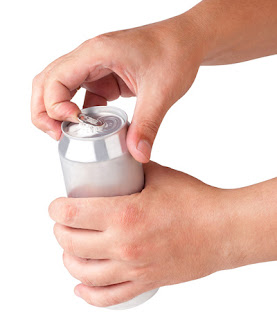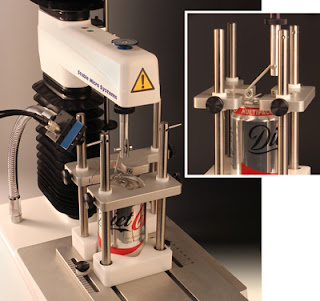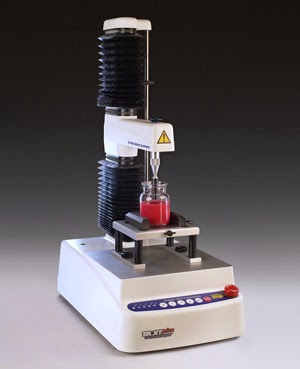 A new rig has been developed to allow manufacturers of food tins and beverage cans to measure the force needed to lift the ring pull and open the container.
A new rig has been developed to allow manufacturers of food tins and beverage cans to measure the force needed to lift the ring pull and open the container. This new development could signal the end of consumer frustration with trying to open metal packaging that is too stiff, or where the ring pull detaches from the lid.
Understanding and quantifying the force needed to use a ring pull is vital for both packaging manufacturers and their customers to ensure safety, functionality and consumer experience.
The force required to open tins and cans is dictated by the shape of the ring pull and lid, their materials and the depth of the groove in the lid.
 |
| Testing carbonated drink can ring pull force |
The rig works by locking the product in place on the TA.XTplus texture analyser and attaching a hook adapter to its ring pull. The hook is pulled upwards, mimicking the action of a person opening the can, while measuring the force needed to lift the ring pull and finally break the seal.
The universal design of the Ring Pull Rig means non-circular shapes, such as meat or fish cans, can also be accurately analysed. The flexibility of Exponent software has also allowed the development of a special test for tins that require a two-step pulling action. The rig first measures the force needed to break the seal before pausing and allowing the user to adjust the hook direction or rotate the tin. The second part of the test then measures the force required to peel and remove the metal lid completely.
 |
| Testing tinned ham ring pull force |
The rig can also be enhanced with the use of an Acoustic Envelope Detector, to capture and measure the ‘fizz’ sound of a carbonated drink. This rig is a Community Registered Design and is a continuation of the ever increasing range of innovative solutions for texture analysis.
To find out more about this new rig, please email us...
We can design and manufacture probes or fixtures for the TA.XTplus texture analyser that are bespoke to your sample and its specific measurement.
Once your measurement is performed, our expertise in its graphical interpretation is unparalleled. Not only can we develop the most suitable and accurate method for the testing of your sample, but we can also prepare analysis procedures that obtain the desired parameters from your curve and drop them into a spreadsheet or report designed around your requirements.
For more information on how to measure texture, please visit the Texture Analysis Properties section on our website.
 The TA.XTplus texture analyser is part of a family of texture analysis instruments and equipment from Stable Micro Systems. An extensive portfolio of specialist attachments is
available to measure and analyse the textural properties of a huge range of
food products. Our technical experts
can also custom design instrument fixtures according to individual
specifications.
The TA.XTplus texture analyser is part of a family of texture analysis instruments and equipment from Stable Micro Systems. An extensive portfolio of specialist attachments is
available to measure and analyse the textural properties of a huge range of
food products. Our technical experts
can also custom design instrument fixtures according to individual
specifications.No-one understands texture analysis like we do!
To discuss your specific test requirements click here...
|



No comments:
Post a Comment